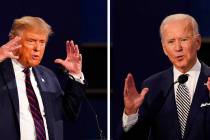Today’s words are tomorrow’s history
So many wags have described the practice of journalism as "history in a hurry" that it is cliché. But sometimes a longer, more patient view is warranted. Sometimes we need to step back and listen carefully to the words. To heed their significance.
This past week, MoveOn.org began airing a political commercial attacking presumed Republican presidential nominee John McCain. It opens showing a birthday cake with five candles, marking the fifth anniversary of President Bush's landing on an aircraft carrier and delivering a speech in front of a banner proclaiming "Mission Accomplished."
It repeats the out-of-context quote in which McCain conceded American troops might still maintain a presence in Iraq 100 years hence. The commercial concludes: "One hundred years in Iraq? And you thought no one could be worse than George Bush."
Coincidentally, this past week also marked the 33rd anniversary of America's "bug out" from Saigon, a war with which Iraq has been frequently compared. (Do the math: At the current rate of American fatalities in Iraq, it will take about 65 years to match those sustained in Vietnam.)
Democratic contenders Barack Obama and Hillary Clinton have been waging a pitched battle over which of them will get our military out of Iraq the fastest.
Clinton has said, "Withdrawal is not defeat. Defeat is keeping troops in Iraq for 100 years. ... Defeat is draining our resources and diverting attention from our key interests."
Obama has said, "This time we want to talk about the men and women of every color and creed who serve together, and fight together, and bleed together under the same proud flag. We want to talk about how to bring them home from a war that never should've been authorized and never should've been waged ..."
Senate Majority Leader Harry Reid has said, "This war is lost and the surge is not accomplishing anything."
On the other hand, John McCain has said, "In Iraq our national security interests and our national values converge. Iraq is truly the test of a generation, for America and for our role in the world. Faced with similar challenges, previous generations of Americans have passed such tests with honor. It is now our turn to demonstrate that our power, ennobled by our principles, is the greatest force for good on earth today. Iraq's transformation into a secure democracy and a force for freedom in the greater Middle East is the calling of our age. We can succeed."
Words never stand alone, but are swept along in the river of history, sometimes forming a confluence with another time.
In September 1938, British Prime Minister Neville Chamberlain addressed the people of Britain, saying he believed after his talks with "Herr Hitler" that Germany could peaceably absorb the Sudetenland and war could be averted.
"However much we may sympathize with a small nation confronted by a big and powerful neighbor," he said, "we cannot in all circumstances undertake to involve the whole British Empire in war simply on her account."
The public was overjoyed that "peace with honour" was achieved.
But in the House of Commons, Winston Churchill predicted, "This is only the beginning of the reckoning. This is only the first sip, the first foretaste of a bitter cup which will be proffered to us year by year unless by a supreme recovery of moral health and martial vigour, we arise again and take our stand for freedom as in the olden time."
Now, I do not remotely pretend to compare McCain's "We can succeed" to what Churchill said to rouse the British people after a flotilla of small boats rescued the remnants of defeated British and French soldiers from Dunkirk and ferried them to Dover. The nation was at nadir. The chill of defeat was in their bones.
Churchill raised his voice over the radio and spoke directly to the British citizenry in words that should never be forgotten: "We shall go on to the end, we shall fight in France, we shall fight on the seas and oceans, we shall fight with growing confidence and growing strength in the air, we shall defend our Island, whatever the cost may be, we shall fight on the beaches, we shall fight on the landing grounds, we shall fight in the fields and in the streets, we shall fight in the hills; we shall never surrender ..."
Those were not just words then. And what the candidates are saying today are not just words. They are tomorrow's lessons of history.
The question is whether the lesson will be in English or Arabic.
Thomas Mitchell is editor of the Review-Journal and writes about the role of a free press and access to public information. He may be contacted at 383-0261 or via e-mail at tmitchell@reviewjournal.com























